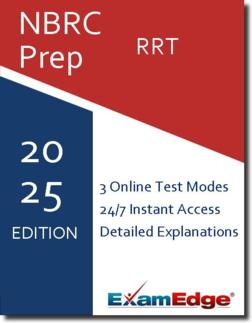NBRC Registered Respiratory Therapist Practice Tests & Test Prep by Exam Edge - Topics
Based on 17 Reviews
- Real Exam Simulation: Timed questions and matching content build comfort for your NBRC RRT test day.
- Instant, 24/7 Access: Web-based NBRC Registered Respiratory Therapist practice exams with no software needed.
- Clear Explanations: Step-by-step answers and explanations for your NBRC exam to strengthen understanding.
- Boosted Confidence: Reduces anxiety and improves test-taking skills to ace your NBRC Registered Respiratory Therapist (RRT).

Understanding the exact breakdown of the NBRC Registered Respiratory Therapist test will help you know what to expect and how to most effectively prepare. The NBRC Registered Respiratory Therapist has 140 multiple-choice questions The exam will be broken down into the sections below:
| NBRC Registered Respiratory Therapist Exam Blueprint | ||
|---|---|---|
| Domain Name | % | Number of Questions |
| PATIENT DATA | 35% | 49 |
| Evaluate Data in the Patient Record | ||
| Perform Clinical Assessment | ||
| Perform Procedures to Gather Clinical Information | ||
| Evaluate Procedure Results | ||
| Recommend Diagnostic Procedures | ||
| TROUBLESHOOTING AND QUALITY CONTROL OF DEVICES, AND INFECTION CONTROL | 15% | 21 |
| Assemble / Troubleshoot Devices | ||
| Ensure Infection Prevention | ||
| INITIATION AND MODIFICATION OF INTERVENTIONS | 50% | 70 |
| Maintain a Patent Airway Including the Care of Artificial Airways | ||
| Perform Airway Clearance and Lung Expansion Techniques | ||
| Support Oxygenation and Ventilation | ||
| Administer Medications and Specialty Gases | ||
| Ensure Modifications are Made to the Respiratory Care Plan | ||
| Utilize Evidence-Based Practice | ||
| Provide Respiratory Care in High-Risk Situations | ||
| Assist a Physician / Provider in Performing Procedures | ||
| Conduct Patient and Family Education | ||


